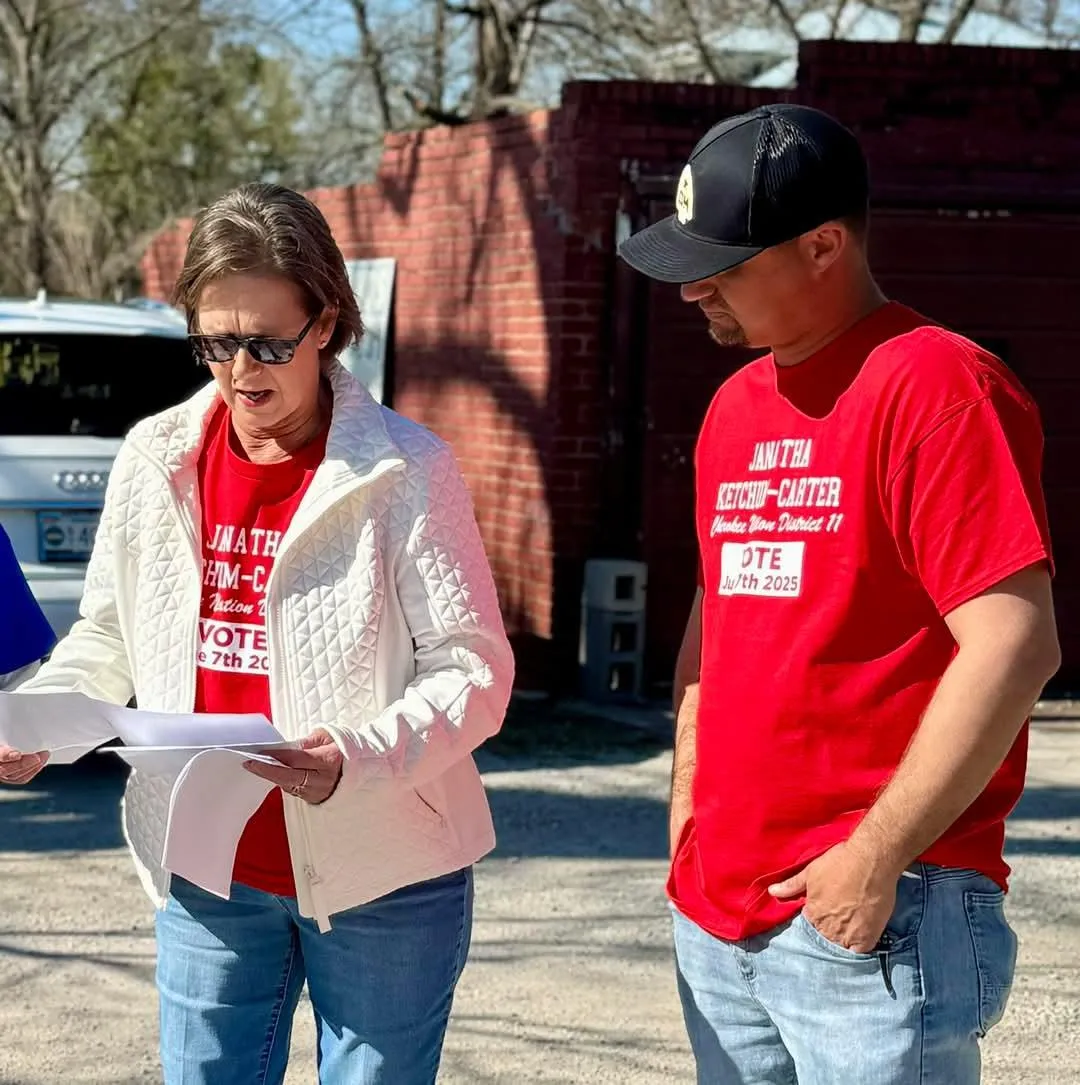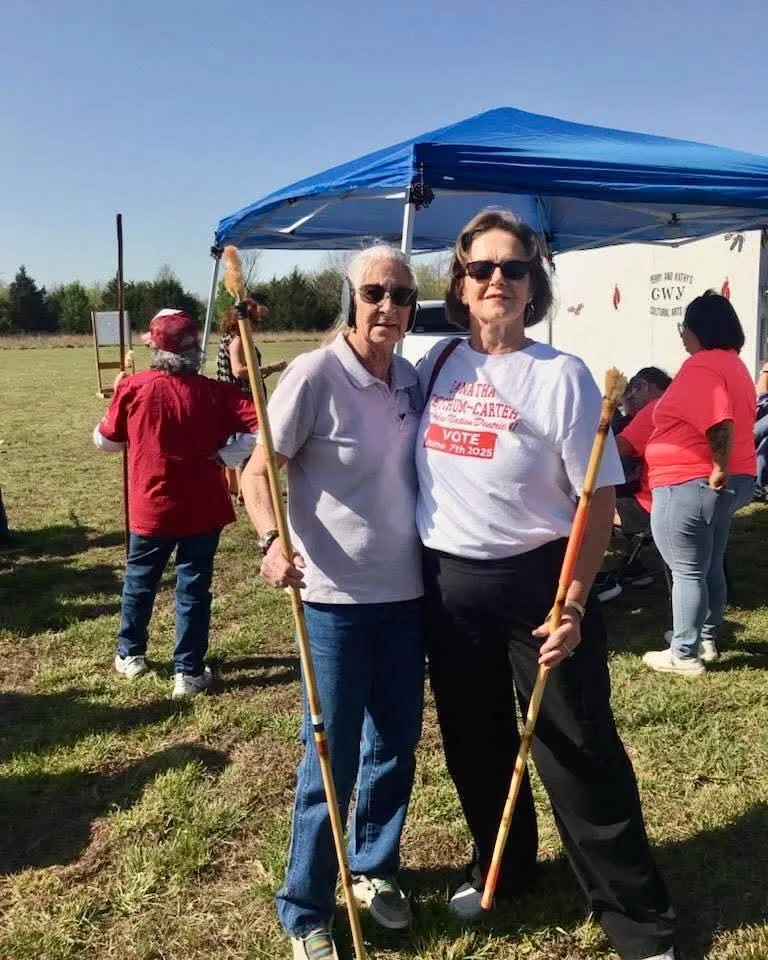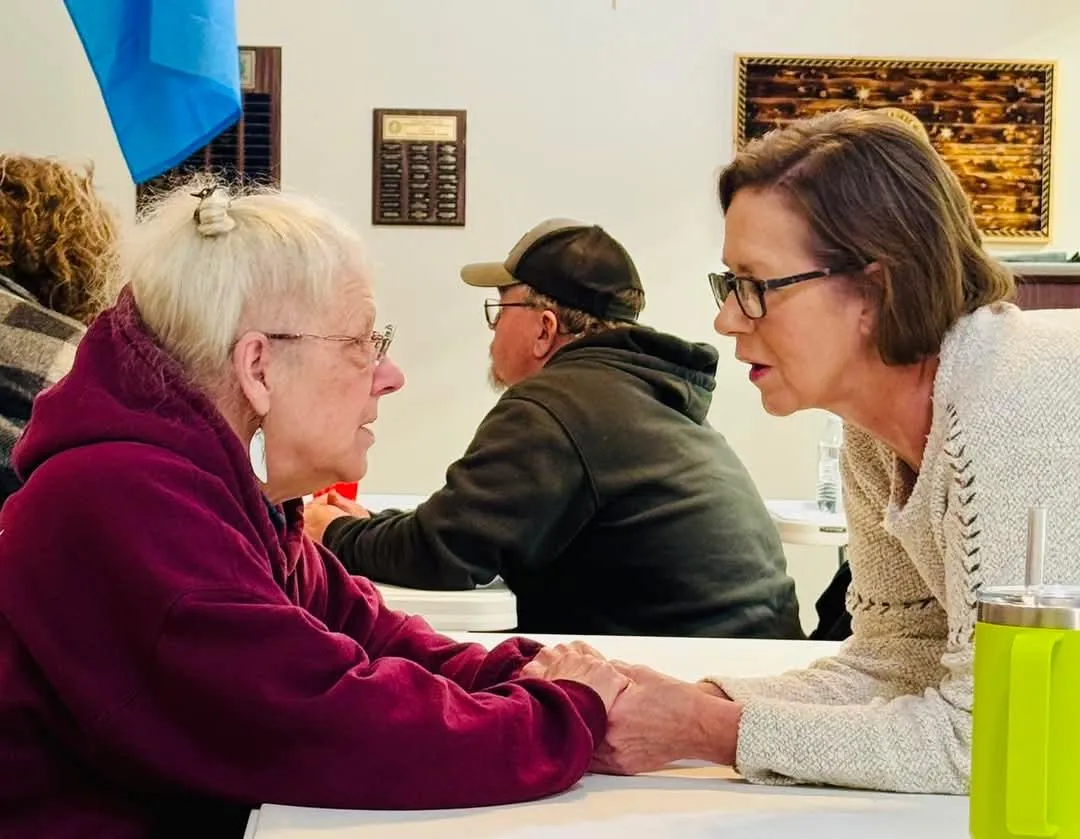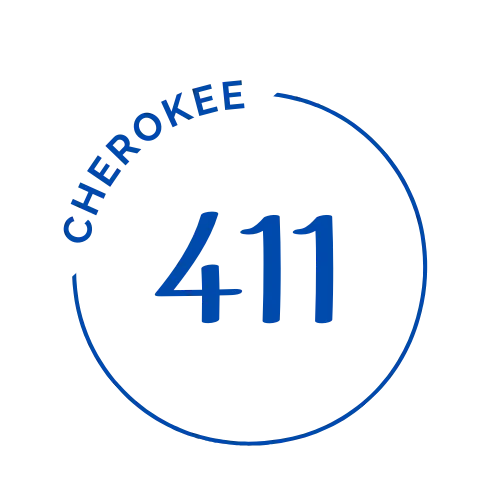
Independent Media: Real, Relevant, and Unfiltered
Cherokee Nation Candidates 2025
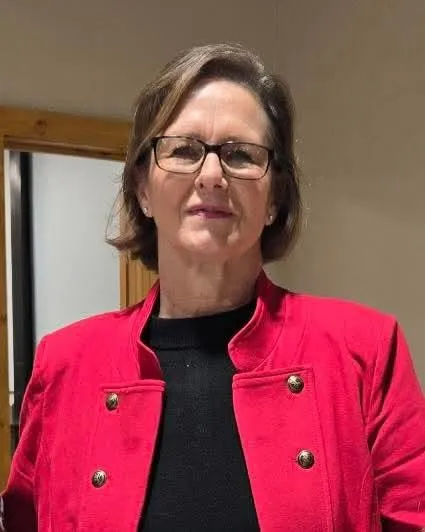
Janatha Ketchum-Carter
District 11 Candidate
Cherokee Nation Tribal Council
1. What or who inspired you to run for office?
What inspired me to run wasn’t just one person or one moment—it was the steady stream of conversations with people from all walks of life who came to me needing help, guidance, or simply someone to listen. Over time, it became clear that many of our Cherokee citizens are hurting or feeling overlooked, and that weighed heavily on me. I didn’t plan to run for office at first, but when people start coming to you over and over—saying they trust you, saying they wish there were more leaders who truly care—it plants a seed. I prayed about it, and I felt led to step up and serve.I’m not running because I want recognition. I’m not doing this for a paycheck. I’m running because I want to be a voice for people who feel like they don’t have one. We have elders who built this Nation, single parents doing their best, and young people who want to feel connected to their culture. They all deserve someone who will listen, show up, and fight for what’s right. That’s what I plan to do. I’m running because the Cherokee people deserve better, and I believe I can help make a difference.
2. What do you see as the biggest challenges facing your district right now?
One of the biggest challenges in our district is simply the size and spread of our communities. We’re a large district, covering many miles and towns, and that means it takes real time and effort to reach everyone. If a Council member is doing their job right, they’re not just sitting in an office—they’re on the road, showing up to community events, listening to people face-to-face, and following through on what they say. That kind of commitment is a full-time effort, and it can’t be done halfway.Too often, folks in outlying towns feel forgotten or left behind. They hear about meetings happening in one area but never see anyone come to theirs. That’s not right. If you represent a district, you should be present in every part of it. That means holding meetings in every community—not just the convenient ones. It means returning calls, responding to messages, and making sure everyone, no matter how rural or small their town may be, feels heard and seen.We need leadership that understands how important visibility is—not just for show, but to build real trust. People deserve more than a vote every four years. They deserve someone they know by name, someone who will show up when it matters most. That’s the kind of leadership I aim to bring.
3. What are the biggest challenges facing the Cherokee Nation right now?
One word: transparency. That’s what I hear over and over again from our people. Folks want to know what’s really going on behind closed doors—how decisions are being made, where the money is going, and why some voices seem to matter more than others. I believe our government should never operate in shadows, especially when we’re talking about the well-being of Cherokee citizens and the future of our Nation.Too many people feel like they’re being left out of the loop. They’ll hear about a big decision that’s already been made and wonder, “When did that happen?” or “Why didn’t we get to weigh in?” That shouldn’t be the norm. Our Cherokee ancestors built this Nation on the values of community, responsibility, and accountability. Somewhere along the way, that connection between the people and the government has weakened—and that’s something I want to help restore.Transparency doesn’t mean just putting out a press release after the fact. It means bringing people into the conversation before decisions are finalized. It means holding public meetings, making records easily available, and listening to concerns without brushing them off. We need to rebuild trust. And trust comes when people feel respected, informed, and included. That’s the challenge I see—and that’s the work I’m ready to take on.
4. What solutions do you want implemented to address the challenges facing your district and the Cherokee Nation?
The first step is creating spaces where people feel safe and empowered to speak up—and more importantly, where someone is actually listening. That’s why I plan to immediately start a community group in Vinita and work to establish similar groups throughout the district. These won’t just be meetings to check a box. They’ll be opportunities for neighbors to come together, share concerns, and talk about real solutions. Every community has its own heartbeat, and we need leadership that takes the time to listen to each one. Beyond that, we have to rebuild the relationship between the Cherokee government and the Cherokee people. That starts with transparency—making meetings public, sharing financial reports, and giving citizens more say in major decisions. If a project is being planned in your community, you should know about it before the ribbon-cutting, not after. We also need to be proactive. That means going to our elders, our single parents, our youth, and asking, “What do you need?” Then following through. It means driving the extra miles to rural areas, bringing resources to where people are—not expecting them to come to us. At the end of the day, this isn’t about power or politics. It’s about service. And the best way to serve is by standing shoulder to shoulder with the people we represent.
5. Can you work with others who do not share your views to help remedy the needs of your district and the Cherokee Nation? Please provide examples of past experiences where you worked with others who disagreed with you then or in the past and created a positive outcome.
Yes, absolutely. I’ve served on many boards, committees, and community groups over the years, and one thing I’ve learned is this: if you’re only willing to work with people who agree with you all the time, you won’t get much done. Differences in opinion are natural—healthy, even. What matters is how you handle them. Do you shut down the conversation, or do you roll up your sleeves and look for common ground?In one board I served on, we had a big disagreement over how to allocate funding for a community project. Tensions were high, and folks had strong opinions. But instead of letting it turn into a fight, I asked questions. I listened. I tried to understand why people felt the way they did. And I shared my own perspective without attacking theirs. Eventually, we came up with a solution that worked for everyone—not perfect, but fair and thoughtful. That’s what collaboration looks like.We’re never going to all think the same, and that’s okay. The important thing is respect. If we remember we’re all here to serve the Cherokee people, not ourselves, then we can always find a way to work together. That’s the kind of leadership I bring to the table.
6. What experiences do you feel you bring to the table that make you qualified for the Cherokee Nation Tribal Council?
I bring a lifetime of listening, service, and standing up for what’s right. I’ve sat around kitchen tables with families who needed help, served on boards where tough decisions had to be made, and volunteered in my community when no one was watching. I don’t have to pretend to care—I’ve lived it. I’ve shown up for people when they needed me, and I plan to keep showing up. I'm not a politician. I’m a neighbor, a parent, and a grandparent. That last one is especially important to me. Being a grandparent changes your outlook. It makes you think even more deeply about the future—not just for ourselves, but for the generations coming up behind us. I want to help build a Nation that my grandkids—and yours—can be proud of. One where they know their identity, where their language is alive, and where their leaders are trustworthy. I've worked with people from all walks of life, and I’ve never been afraid to ask hard questions or speak the truth. I’m dependable. I show up. And I don’t forget where I come from or who I’m fighting for. That’s the kind of experience that matters—not just on paper, but in the hearts and homes of the Cherokee people.
7. Why do you think voters should trust you?
Because I’ve earned that trust through years of simply being who I say I am. I’m not running for a title or a check—I’m running because I care deeply about our people and the future of our Nation. If you ask around, you’ll hear the same thing: “She’ll show up. She’ll listen. She’s not doing this for herself.”Trust isn’t something you demand—it’s something you build, over time, through your actions. I’ve helped people when they needed a hand, spoken up when something didn’t sit right, and followed through when others walked away. I know what it means to be reliable, and I know how to be accountable. That’s what I’ve always tried to be in my life—someone folks can count on. I tell people all the time, “Check my record. Ask anyone who knows me.” I have nothing to hide and no reason to pretend. I believe in walking with integrity, even when no one’s looking. And I believe in leading with a servant’s heart—not just words, but action.This campaign isn’t about promises. It’s about commitment. If I’m honored with your vote, I’ll work every day to make sure you never regret putting your trust in me. That’s my word, and I intend to keep it.
8. How will you balance the legislative and executive branches of the Cherokee Nation?
The legislative and executive branches must be separate—and that separation must be respected. The Council is the voice of the people. We’re elected to represent our communities, ask the hard questions, and hold leadership accountable. That cannot happen if Council members are pressured to fall in line or fear retaliation for speaking their truth. I believe a healthy government is one where people can disagree respectfully, where debate is encouraged, and where every branch understands its role. As a Councilor, I won’t be afraid to stand my ground. I’ll speak my mind, vote my conscience, and always remember who I represent—the Cherokee people, not the administration or special interests. There's nothing wrong with working together, but that doesn’t mean rolling over or giving up your independence. Balance means checks and balances. It means being honest, even when it’s uncomfortable. It means making decisions with full transparency and full accountability. When branches blend too closely, the people lose their voice. I will not let that happen. I’ll protect the Council’s independence and make sure our government stays rooted in fairness, balance, and integrity. We should never be punished for thinking differently. We were elected to serve, not to fall in line—and that’s exactly how I’ll lead.
9. What does balance between the branches of the Cherokee Nation government mean to you?
To me, balance between the branches of government means respect, independence, and open dialogue without fear of punishment. Each branch—executive, legislative, and judicial—has its own responsibilities, and when those lines are respected, the Cherokee people benefit. That’s how we ensure fairness and accountability across the board. The Council shouldn’t just be a rubber stamp for what’s already been decided. We’re elected to ask questions, to speak for our districts, and to represent the people’s voice—not the administration’s agenda. Balance means Council members can disagree with the Chief and still be treated with dignity. It means we can raise concerns, suggest changes, and debate issues without retaliation. That’s not just good governance—that’s our responsibility. When the branches are too entangled, decisions start happening behind closed doors, and that’s when trust is lost. But when there’s real balance, you have open discussion. You have checks and safeguards. You have a government that actually listens.I want to help restore that balance. I want to bring back the kind of leadership where Councilors are encouraged to speak their mind, not silenced for it. We owe it to our people to govern with courage and honesty, and that starts with respecting the roles we’ve each been given.
10. Please provide examples of how you would want to improve transparency in the Cherokee Nation government.
Transparency should never be optional—it should be built into everything we do as a Nation. If decisions are being made on behalf of the Cherokee people, then the people have a right to know about them, plain and simple. One of the first steps I’d take is to make all Council and committee meetings open to the public. If there’s nothing to hide, then there’s no reason to close the doors. Our people should be able to attend in person or watch online—no matter where they live.I also believe meeting agendas, minutes, and recordings should be posted in an easy-to-access location. You shouldn’t have to hunt for information. And you shouldn’t have to guess what’s happening in your government. We work for the people, not the other way around. Another change I’d like to see is community briefings after major decisions are made. A lot of folks feel left in the dark. If the Nation is starting a new program or investing in a big project, there should be a public explanation of why it’s happening, how it’s funded, and who it will benefit. The Cherokee people are smart, strong, and capable. They deserve a government that keeps them informed, treats them like partners, and never forgets where its authority comes from—the people themselves.
11. Please provide examples of how you would want transparency improved in the Cherokee Nation Businesses.
Our Cherokee Nation Businesses are owned by the people, which means the people deserve to know how they’re being run and where the money is going. I believe financial reports should be made public—regularly and in full. Not just summaries or press statements, but real, detailed reports that any Cherokee citizen can review. If it’s funded by our Nation, we have a right to see the books.I also believe major decisions—especially those involving land, large investments, or partnerships—should be brought before the Council and, when appropriate, before the people. These aren’t just business moves—they’re long-term choices that affect our communities, our sovereignty, and our future. Cherokee citizens deserve a voice in that process.Too often, business dealings happen behind closed doors, and by the time anyone hears about it, it’s already a done deal. That’s not transparency—that’s secrecy. I’m not saying every negotiation needs to be public, but there should be a clear line where the Council—and the people—are looped in and given the opportunity to weigh in.We can run successful businesses while still honoring our values. And one of our core values is accountability. When the people know the truth, they can make informed decisions and have real trust in their Nation’s leadership. That’s what I’ll fight for every step of the way.
12. Do you think the Cherokee Nation is providing adequate health care for its citizens? Please provide examples.
Health care is one of the top concerns for our citizens, and I believe more of our Nation’s funding should be directed toward improving it. We are facing serious staffing shortages in our clinics, which impacts the quality and timeliness of care. Instead of building more community buildings right now, I believe those funds should be redirected to support healthcare services where the need is critical.
Janatha Ketchum-Carter
Candidate Cherokee Nation Council, District 11
(918) 244-4921
https://www.facebook.com/profile.php?id=61571064097918&mibextid=ZbWKwL
